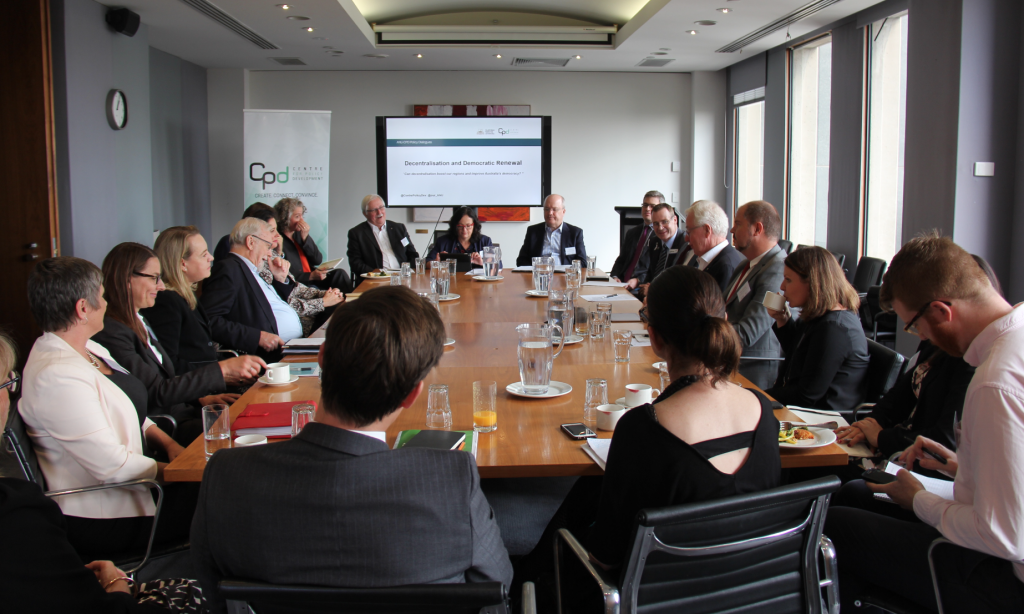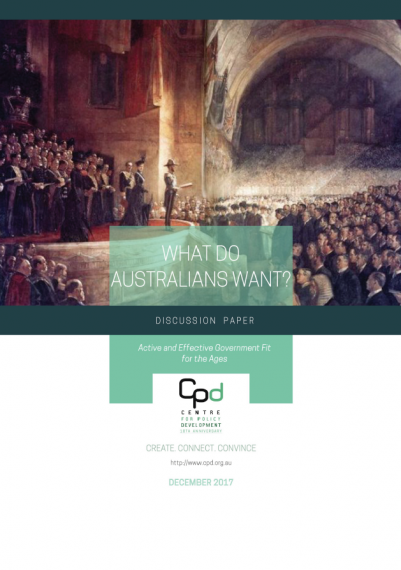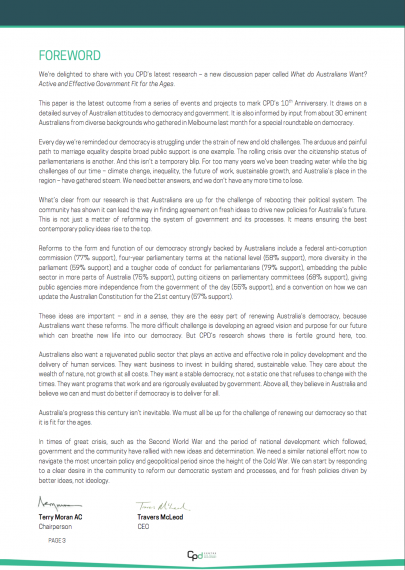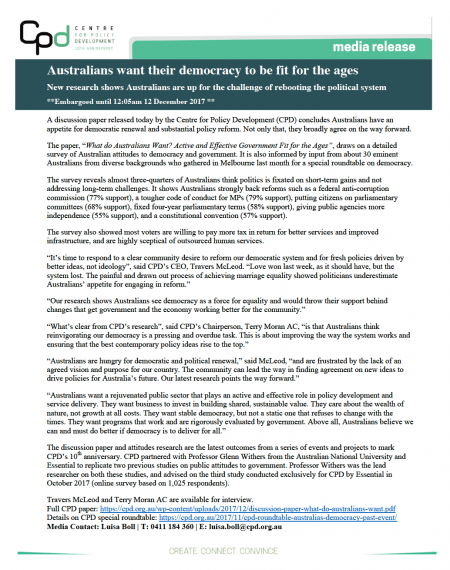
On 29 March 2018, CPD and ANU invited leaders from government, business, civil society, academia and the media to discuss the question ‘can decentralisation boost our regions and improve Australia’s democracy?’. The roundtable considered the extent to which decentralisation can spur growth, better government, and improved human services across Australia. It was a timely discussion given the Federal Government’s recent decentralisation push and new CPD research on Australia’s democracy, undertaken in partnership with Essential and ANU’s Professor Glenn Withers AO. A key discovery of that research was community support for more decentralisation: 75 per cent of Australians are in favour of embedding the public sector in major cities and regions.
Our Policy Dialogue was hosted by former Foreign Minister, the Hon Gareth Evans AC QC and moderated by CPD’s Chair Terry Moran AC. It featured Professor Glenn Withers AO (ANU), Mark Birrell (former Chair of Infrastructure Australia), Nadine Flood (National Secretary, Community and Public Sector Union), and Simon Pryor (Executive Director Policy, Business Council of Australia).
Key points of the discussion
The key questions at heart of our Dialogue were:
- Can decentralisation spur growth, better government, and improved human services across Australia?
- What are opportunities for growing business activity linked to regional economic strengths?
- What might an (independent) framework for decentralisation look like?
The interactive discussion commenced with some opening remarks by our speakers. One of the speakers noted that decentralisation is always associated with the most egregious examples and that the topic needs to be discussed properly since the evidence is showing that putting most things in one place doesn’t always work. It was also said that one key consideration should be how decentralisation can be used to spur growth in places where there wouldn’t otherwise be growth (including our cities). We also heard about the history of the idea and how it is usually dismissed as a key policy/design vector but receives strong support among the public and that it has larger payoffs than we might think. This was supported by some practical governance and design examples.
The opening remarks were followed by a wide-ranging discussion with a diverse and expert audience. Participants included: Anthea Harris (Lead Deputy Secretary, Strategy and Planning at Department of Economic Development, Jobs, Transport and Resources, Victoria), Bo Li (Senior Policy Officer, Victorian Local Governance Association), Bronwen Clark (Executive Officer, National Growth Areas Alliance), Collin Ross (Mayor of Cardinia Shire Council), David Donaldson (Journalist, The Mandarin), Danielle Storey (CEO, Eastern Innovation Business Centre), Gareth Evans AC, QC (Chancellor, ANU), Gemma Henderson (Principal, The Boston Consulting Group), Gillian Sparkes (Victorian Commissioner for Environmental Sustainability), Glenn Withers (Professor of Economics, ANU), Holly Ransom (CEO, Emergent), Jim Miller (Chair, Infrastructure Victoria), Kathryn Arndt (Chief Executive Officer, Victorian Local Governance Association), Mark Birrell (Former Chair of Infrastructure Australia), Michael Rowland (Co-presenter ABC News Breakfast), Michelle Cox (Policy Adviser, Business Council of Australia), Nadine Flood (National Secretary, Community and Public Sector Union), Sarah Barker (Special Counsel, MinterEllison), Simon Pryor (Executive Director Policy, Business Council of Australia), Stuart Whitman (Research Engagement Manager, Australian Catholic University), Terry Moran AC (Chair, Centre for Policy Development), Travers McLeod (CEO, Centre for Policy Development).
Other key points of the discussion included:
- Decentralisation through increasing size of the APS instead of their relocation.
- Decentralisation of government bodies to cities and towns where local workforces encompass the skill base of the new agency.
- The link between decentralisation and the improvement of human services such as settlement services to help refugees find work faster which would be a triple-win for Australia.
CPD would like to thank Gareth Evans and the team at ANU House for hosting the event, and participants who contributed to an engaging and expert start to the ANU-CPD Policy Dialogue Series.
Related Documents
 |
 |
 |
|---|---|---|
| Full discussion paper | Foreword |
Media release |



